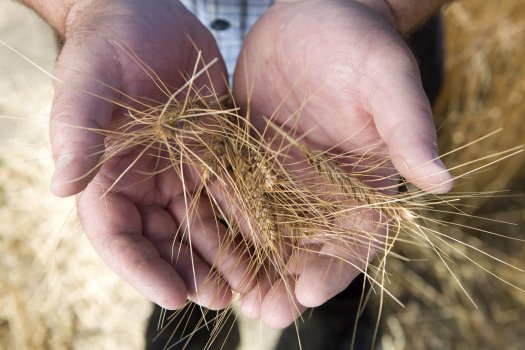Related Articles:
– Exposed: the great GM crops myth
– The World According to Monsanto – A documentary that Americans won’t ever see
– At stake is no less than control of the world’s food supply.
– BIODIVERSITY: Privatisation Making Seeds Themselves Infertile
Companies accused of ‘profiteering’ as they attempt to patent crop genes
Giant biotech companies are privatising the world’s protection against climate change by filing hundreds of monopoly patents on genes that help crops resist it, a new investigation has concluded.
The study – by the authoritative Action Group on Erosion, Technology and Concentration (ETC Group), based in Ottawa, Canada – has found that nine firms have filed at least 532 patents around the world on about 55 different genes offering protection against heat, drought and floods. If granted, the companies would be given control of crucial natural raw material needed to maintain food supplies in an increasingly hungry world.
Last week, as world leaders met in Rome to discuss the food crisis, GM companies promoted their technologies as the answer to hunger. On Thursday, Monsanto – the biggest and most controversial firm – announced a “commitment” to increase food production, partly by developing crops that need less water.
“Together we must meet the needs for increased food, fibre and energy, while preserving the environment,” said the company’s head, Hugh Grant. “These commitments represent the beginning of a journey that we will expand on and deepen in the years ahead.”
The ETC Group calls this “an opportunistic public relations strategy”, adding: “Monsanto’s business is selling patented seeds for industrial agriculture – not addressing a humanitarian food crisis.”
The report of its investigation shows that Monsanto and BASF – which last year announced a $1.5bn “collaboration” to develop new GM crops, including “ones more tolerant to adverse environmental conditions such as drought” – have between them filed patents for 27 of the 55 genes. Others had been filed by companies such as Bayer, Syngenta and Dow.
The reports says some of the applications are sweeping. One would cover more than 30 crops from oats to oil palms, triticale to tea, and potatoes to perennial grass – “in other words, virtually all food crops”.
It says the “corporate grab on climate-tolerant genes” means that “a handful of transnational companies are now positioned to determine who gets access to key genetic traits and what price they must pay”.
Small farmers in developing countries will be particularly hard hit by such “climate-change profiteering”. Patenting will make the crops expensive and ensure that poor farmers have to buy them every year, by prohibiting them from saving seeds from one harvest to grow for the next.
According to the report, conventional, non-GM breeding techniques are making remarkable progress in developing crops that can tolerate heat, floods and drought. A new Asian rice, due to go on the market next year, can stand being submerged for two weeks without affecting yields, while a new African one flowers early in the morning, escaping the heat of the day.
But, it says, “the patent grab is sucking up money and resources that could be spent on affordable, farmer-based strategies for survival”.
It concludes: “These patented technologies will ultimately concentrate corporate power, drive up costs, inhibit independent research and further undermine the rights of farmers to save and exchange seeds”.
But Croplife, which represents the world’s plant-science industry, retorts; “Patenting is very important. That is how we protect intellectual property and ensure we continue to bring new innovations to the marketplace.” It denies that biotechnology companies are seeking to monopolise world food supplies.
Read moreBiotech giants demand a high price for saving the planet

